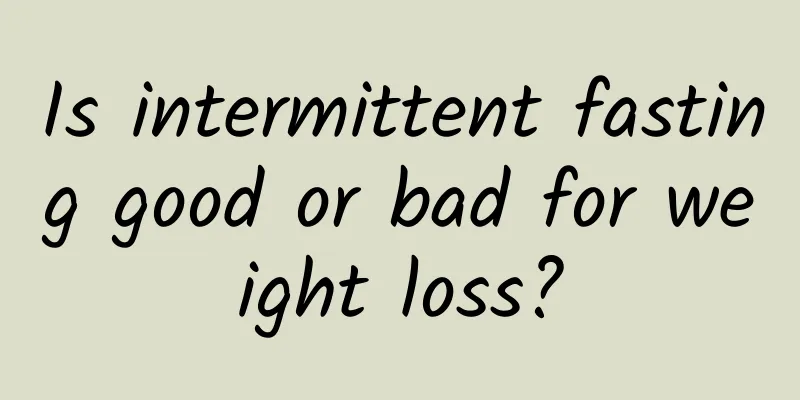Is intermittent fasting good or bad for weight loss?

|
Cai Jiaqing, School of Basic Medical Sciences, Huazhong University of Science and Technology, Yi Xinlan, School of Basic Medical Sciences, Huazhong University of Science and Technology Recently, a "water fasting" weight loss method has become increasingly popular among Korean teenagers, and many girls are crazy about it. With the improvement of living standards in recent years, the obesity rate has increased. The popularity of "Hot and Spicy" at the beginning of the year and Jia Ling's successful weight loss have added fuel to the fire of weight loss! Many people, especially the younger generation, have begun to use various intermittent fasting methods to lose weight. Intermittent fasting is a popular weight loss method in recent years! 16/8 intermittent fasting, 5:2 intermittent fasting, alternate-day intermittent fasting, etc., are endless and dazzling. Which one is the most effective? Are these plans really scientific? Is the final result good or bad? Many questions linger in the mind, making many people who "set a weight loss flag" dare not try it easily. What is intermittent fasting? Intermittent fasting is one of the most popular ways to lose weight. Intermittent fasting, also known as intermittent fasting, refers to a diet in which you eat normally sometimes and eat less or not at other times, alternating between eating and fasting. Compared with "calorie restriction" where you have to be hungry every day and think twice before eating an extra piece of meat, intermittent fasting does not restrict calories and allows you to indulge during eating periods, making it popular. Among them, the 16:8 time-limited eating plan has the highest acceptance. 16/8 light fasting, as the name suggests, means fasting for 16 hours a day and eating for 8 hours, with no limit on calories during eating. The basic principle of this fasting method is to consume the liver glycogen stored in the liver by fasting for 16 hours, and to use the triglyceride (TG) metabolism in the fat cells to provide energy, so as to achieve the purpose of consuming fat reserves. The fasting time between meals of a normal diet may not be enough to consume fat, but extending the fasting time to consume the stored fat means that the body weight has decreased, achieving the purpose of "weight loss". Is intermittent fasting good or bad? Since the British doctor proposed the concept of "intermittent fasting" in 2012, many studies have proven its scientificity and benefits. Many studies have shown that intermittent fasting can not only reduce weight, but also regulate blood sugar and blood lipids, improve insulin sensitivity, change intestinal flora, and even delay aging. One of the randomized clinical trials showed that for the 16:8 intermittent fasting, it is better to eat earlier rather than later, and control the eating time to 6:00-15:00 in the morning, which is more helpful to improve insulin sensitivity, lower fasting blood sugar, lose weight and fat, fight inflammation, and promote intestinal health. In other words, the Taoist saying of not eating after noon (here refers to 15:00) can maximize the effect of intermittent fasting. However, the emptying time of the stomach is 2 to 3 hours. If you are often fasting, in addition to the side effect of excessive stomach acid and ulcers, long-term lack of calories will also cause muscle atrophy and even mental problems such as depression. Therefore, the 16+8 weight loss method will have adverse effects on the body. At present, the pros and cons of this approach are not clear, and more high-quality research is needed to confirm it. Moreover, the 16+8 intermittent fasting method is not suitable for everyone. Adults who are overweight, obese, or close to the upper limit of the body mass index (BMI), and who eat too much on a daily basis can try the "16+8 intermittent fasting method." But!!! These types of people are not suitable for "light fasting": (1) This method is not suitable for people with normal or even thin BMI, people with insufficient muscle mass, or people with malnutrition; (2) Minors, pregnant women, nursing mothers, patients with depression, gastrointestinal diseases, gallbladder diseases, liver and kidney diseases, and people with poor blood sugar control should also use it with caution; (3) People who suffer from high blood pressure, heart disease and other problems should conduct relevant safety assessments in advance and follow the doctor's advice. In general, it is not recommended for ordinary people to use the "16+8 intermittent fasting method" for a long time. A healthy diet is the best way to lose weight Compared with intermittent fasting to lose weight, a reasonable and healthy diet is more important and healthier. Healthy diet is a complex topic, involving individual differences, lifestyle, genetic factors and a variety of environmental factors. Research on finding a healthier diet pattern is still ongoing, and we must continue to explore a healthy lifestyle that suits us and is easy to stick to. Popular diets are always changing, and the only thing that remains unchanged is the simple four words - eat well. The following are some reasonable and healthy weight loss suggestions. 01 Control total energy intake [Height (cm) - 105] × energy coefficient (15-35 kcal/kg) to calculate the daily energy for an individual adult; Encourage the staple food to be based on whole grains, accounting for at least half of the grains, appropriately increase the intake of coarse grains and reduce the intake of refined white rice and flour; Ensure adequate intake of fresh fruits and vegetables, with a variety of fruit and vegetables, but reduce the intake of high-sugar fruits and high-starch vegetables; Alcohol consumption should be strictly limited during weight loss. Each gram of alcohol can produce about 7kcal of energy, which is much higher than the energy value produced by the same mass of carbohydrates and proteins. 02 More eggs and milk, less oil is healthier Use more cooking methods such as steaming, boiling, sautéing and frying, use less oil, and reduce the amount of high-fat foods; Animal foods should give priority to ingredients with low fat content, such as lean meat, skinless chicken breast, fish and shrimp, etc. 03 Eat regularly Pay attention to breakfast, do not skip meals, do not eat late, do not overeat. Chew and swallow carefully, eat less snacks, eat vegetables and meat first, then staple food. 04 Move more and stay quiet less Insufficient or lack of physical activity and a sedentary lifestyle are important causes of obesity. The exercise principle for obese patients to lose weight is to mainly perform low- to moderate-intensity aerobic exercise, supplemented by resistance exercise. Perform 150 to 300 minutes of moderate-intensity aerobic exercise 5 to 7 days a week, at least once every other day; resistance exercise 2 to 3 days a week, once every other day, 10 to 20 minutes each time. Consume 2000 kcal or more of energy through exercise every week. The time of sitting still and passive screen watching should be controlled within 2 to 4 hours a day. For those who sit still for a long time or work at a desk, they should get up and move around for 3 to 5 minutes every hour. 05. Get enough sleep Staying up late, lack of sleep, and irregular work and rest can cause endocrine disorders, abnormal fat metabolism, increase the risk of obesity, and lead to "overwork obesity". Obese patients should follow the circadian biological rhythm and ensure about 7 hours of sleep per day. It is recommended to go to bed before 11 pm. In short, the core principle of weight loss is the calorie deficit - control the total calories of food, eat a balanced diet and meet the nutritional standards, lose 300-500 kcal of calories per day, lose 1-2 catties per week, and you will lose weight if you stick to it. The ideal weight loss goal should be to reduce 5%-10% of the current body weight within 6 months. The reasonable weight loss speed is to lose 2-4 kg per month. Never try a rapid weight loss diet. The diet is not nutritious enough and can easily lead to hypoglycemia, dizziness and even affect menstruation due to lack of nutrition. It may also cause psychological problems such as depression and anorexia. |
<<: Knowledge on prevention and control of epidemic hemorrhagic fever
>>: How painful is it to give birth? Let's see what the anesthesiologist says~
Recommend
Causes of black discharge before period
Everyone must know the importance of menstruation...
How to deal with breast lumps?
Breast lumps are common in postpartum women. This...
What should be paid attention to in the treatment of menopausal amenorrhea
When a woman shows signs of menopause, she should...
Ovulation test paper weak positive before menstruation
Ovulation test strips are also a way that more an...
How to perform myopia surgery? Can it be done? One article explains it clearly
There is a disease that spreads evenly... From 70...
What types of bamboo do giant pandas eat? How to remove bamboo roots?
Bamboo can be eaten when it is still bamboo shoot...
HPV symptoms pictures
As we all know, HPV is a necessary condition for ...
Does pearl powder have side effects when used as a facial mask?
Nowadays, people pay more and more attention to t...
Why do girls feel hot down there?
If girls often feel hot down there, it may be due...
Causes of heel pain in middle-aged women
There are two reasons for women's heel pain. ...
What ointment to use for vaginal itching
Vaginal itching is a common disease. Female patie...
Will my period be delayed in summer?
Generally speaking, there is no particularly dire...
At what age do girls stop growing?
There are many issues that girls need to pay atte...
Pregnancy skin care products contain fragrance
For pregnant women, the selection of skin care pr...
What is the secret to women’s eternal youth?
Many women hope that they can stay young forever ...









